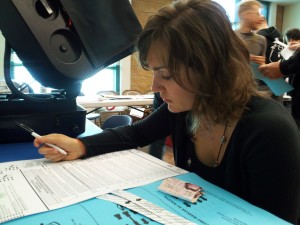The answer, according to Johns Hopkins University computer security expert Avi Rubin, is that there is no way to guarantee an accurate vote count online. "I'm pretty disappointed to hear that someone is running for secretary of state with this platform," he said.
California's current secretary of state, Debra Bowen, is a leader among voting officials when it comes to security, said Rubin. But her term expires in 2014.
Rubin served on a task force that evaluated a system the U.S. Defense Department was considering to allow overseas military personnel to cast their ballots online. The department ended up rejecting the system based on the task force's recommendations.
It's not that computers can't count votes. They obviously can, since machines are used all over the country to scan paper ballots and tally the results.
The problem, says Rubin, is that no one has come up with a backup system to check the validity of votes, other than paper ballots.
Take the current election, for example. A measure to fund transportation projects in Alameda County with a sales tax needed 66.67 percent of the vote to pass but only got 66.53 percent. On Monday the Alameda County Transportation Commission formally reserved the right to a recount.
Depending on how much the challengers are willing to pay, the election workers will either run the paper ballots back through the machines that tallied them in the first place, or else count them by hand. It's time consuming and expensive, but if there were no ballots to recount, the supporters of the measure would just be out of luck.
And no one is suggesting any fraud in that vote. When the stakes are higher, that possibility might well arise. Questions swirled around voting machines in the 2004 presidential election, especially those that didn't generate any kind of paper trail.
Online, the potential problems multiply. "The internet is vulnerable place," said Rubin. "The hacking threat is real if you're talking about the president of the United States."
Although some other countries have experimented with online voting, their experience doesn't prove the systems are secure -- only that no obvious problem has cropped up yet.
So how can banking online be safe if voting online isn't?
Online banking works because the customer and the bank are watching over each other. If the bank makes a mistake and suddenly subtracts $100,000 from your checking account, you'll notice pretty quickly. Together, you and the bank will get to the bottom of the problem.
"Banks do lose money by banking on the internet," said Rubin. "They write that down as the cost of doing business."
Voters, on the other hand, must be able to cast their votes in secret so they can be free of coercion. But that means voters have no way to prove how they voted, so there is no backup system to verify the official results.
Yee acknowledges these problems. He just thinks there must be some way to overcome them. "I bet you in the 1930s the thought of sending a person to the moon was just unimaginable," he said. " But it happened. And it happened because that thought of putting a person on the moon never died. One not ought to simply throw up their hands and say, 'Let's not not have any further discussion.' I want to have that discussion."
